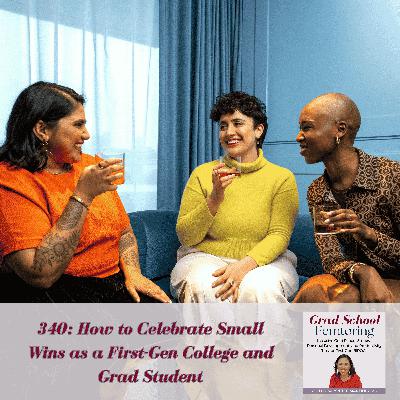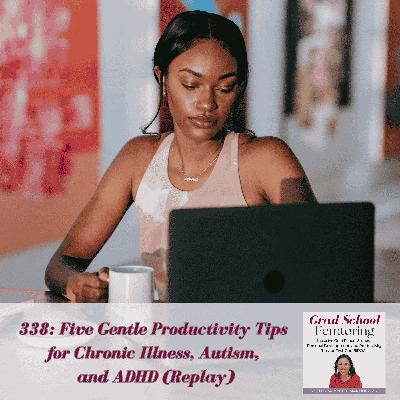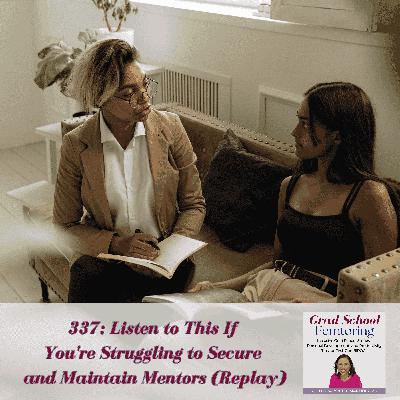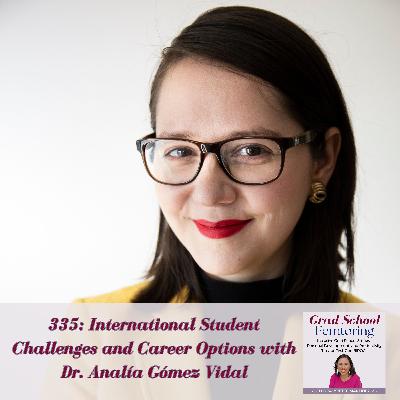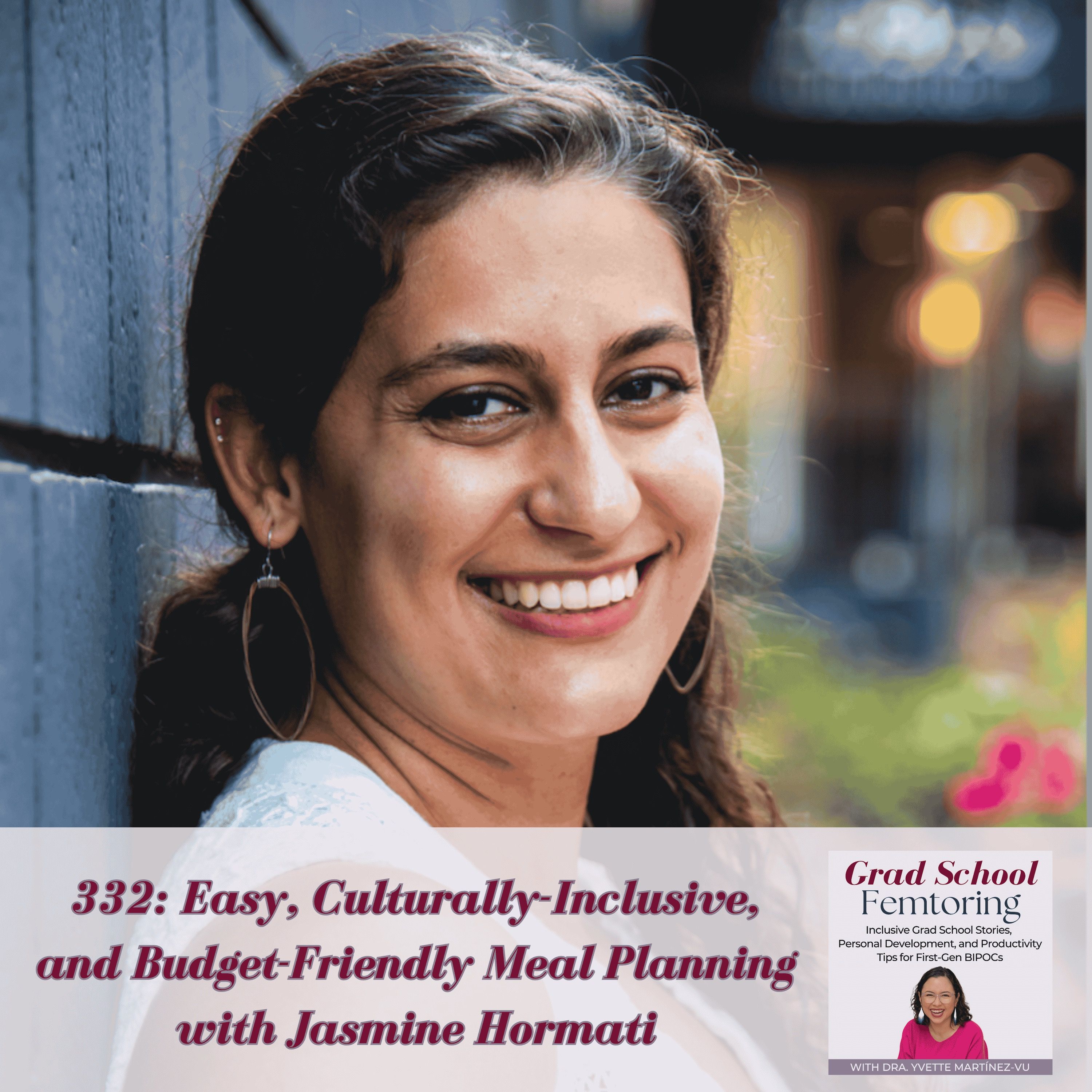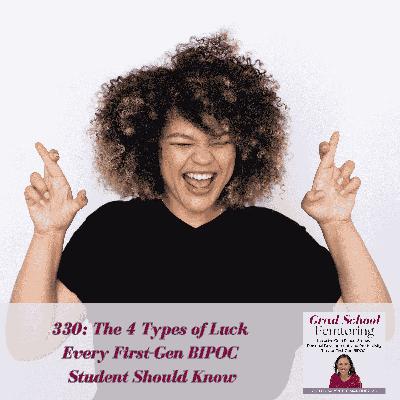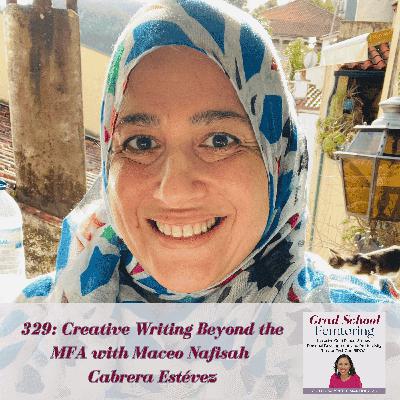Discover Grad School Femtoring: Inclusive Grad School Stories, Personal Development, and Productivity Tips for First-Gen BIPOCs
Grad School Femtoring: Inclusive Grad School Stories, Personal Development, and Productivity Tips for First-Gen BIPOCs

Grad School Femtoring: Inclusive Grad School Stories, Personal Development, and Productivity Tips for First-Gen BIPOCs
Author: A podcast on thriving in graduate school for first-generation BIPOC students, offering insights on academic success, career development, mental health, and navigating diversity and inclusion in higher education.
Subscribed: 18Played: 755Subscribe
Share
© Grad School Femtoring, LLC
Description
The Signal Award-winning Grad School Femtoring Podcast provides first-generation BIPOC students and professionals with conversations about graduate school and growth to help you sustainably achieve your goals.
I’m your host, Dra. Yvette Martinez-Vu, a first-gen Chicana, mama, neurodivergent, and chronically ill grad school and productivity coach, consultant, author and speaker. For over fourteen years I’ve been empowering first-gen students of color along their personal and professional journeys, and I’m really excited to support you too.
Listen every Friday to solo and guest episodes where you’ll be listening in on inclusive grad school stories. You'll also learn more about grad school and academic success, career and professional development, personal development and mindset, productivity and time management, social justice and community building, wellbeing and mental health, money and financial literacy, first-gen student of color experiences, and more!
This podcast is a proud member of the Atabey & Co. Network. Subscribe wherever you listen to podcasts and share this resource with a friend.
I’m your host, Dra. Yvette Martinez-Vu, a first-gen Chicana, mama, neurodivergent, and chronically ill grad school and productivity coach, consultant, author and speaker. For over fourteen years I’ve been empowering first-gen students of color along their personal and professional journeys, and I’m really excited to support you too.
Listen every Friday to solo and guest episodes where you’ll be listening in on inclusive grad school stories. You'll also learn more about grad school and academic success, career and professional development, personal development and mindset, productivity and time management, social justice and community building, wellbeing and mental health, money and financial literacy, first-gen student of color experiences, and more!
This podcast is a proud member of the Atabey & Co. Network. Subscribe wherever you listen to podcasts and share this resource with a friend.
341 Episodes
Reverse
In this episode of the Grad School Femtoring Podcast, I address the prevalence of masking and overcompensating as survival mechanisms for first-gen and neurodivergent students. I also share persona reflections and explore why these behaviors develop, how they can lead to burnout, and what practical strategies you can test out today to resist them. You’ll learn the importance of finding identity-affirming spaces, setting boundaries, advocating for accommodations, and more.Sign up for the free Latinas in Podcasting Summit here (this is my affiliate link).Learn more about my coaching services here and get on the waitlist for my group coaching pods here.Get your free copy of my Grad School Femtoring Resource Kit here.Support our free resources with a one-time or monthly donation.To download episode transcripts and access more resources, go to my website: https://gradschoolfemtoring.com/podcast/ This podcast is a proud member of the Atabey & Co. Network.*The Grad School Femtoring Podcast is for educational purposes only and not intended to be a substitute for therapy or other professional services.* Hosted by Simplecast, an AdsWizz company. See pcm.adswizz.com for information about our collection and use of personal data for advertising.
In this episode of the Grad School Femtoring podcast, I discuss the significance of rewarding yourself and how to celebrate small wins as a student. Drawing from personal experiences and the science behind it, I explain how celebrating achievements can boost motivation. I also share several practical strategies for rewarding yourself, including writing affirming notes, sharing wins with others, taking mini breaks, and much more.If you liked what you heard, check out episode 184 on how to foster joy in grad school.Learn more and get on the waitlist for my group coaching pods here.Get your free copy of my Grad School Femtoring Resource Kit here.Support our free resources with a one-time or monthly donation.To download episode transcripts and access more resources, go to my website: https://gradschoolfemtoring.com/podcast/ This podcast is a proud member of the Atabey & Co. Network.*The Grad School Femtoring Podcast is for educational purposes only and not intended to be a substitute for therapy or other professional services.* Hosted by Simplecast, an AdsWizz company. See pcm.adswizz.com for information about our collection and use of personal data for advertising.
In this episode of the Grad School Femtoring Podcast we focus on the importance of cultivating curiosity and care in careers with guest Naseem Kapdi. Naseem, a career coach and founder of Kimiya Coaching, shares her journey from teaching to coaching, emphasizing the power of pausing and playing in personal and professional development. We explore overcoming hustle culture, leaning into intuition, and celebrating small wins, offering practical tips for first-gen BIPOC listeners navigating grad school, careers, and beyond.If you liked what you heard, check out episode 184 on how to foster joy in grad school. Learn more and get on the waitlist for my group coaching pods here.Get your free copy of my Grad School Femtoring Resource Kit here.Support our free resources with a one-time or monthly donation.You can connect with Naseem at the following links:Website: https://kimiyacoaching.wordpress.com/Linkedin: https://www.linkedin.com/in/naseemkapdi/To download episode transcripts and access more resources, go to my website: https://gradschoolfemtoring.com/podcast/ This podcast is a proud member of the Atabey & Co. Network.*The Grad School Femtoring Podcast is for educational purposes only and not intended to be a substitute for therapy or other professional services.* Hosted by Simplecast, an AdsWizz company. See pcm.adswizz.com for information about our collection and use of personal data for advertising.
In this episode of the Grad School Femtoring Podcast, I share my top five productivity tips for chronic illness, autism, and ADHD. Inspired by the many shortcomings of conventional productivity advice, particularly its lack of inclusivity for disabled, neurodivergent, and chronically ill individuals, I share strategies that can be adaptable for those who are autistic, ADHD, or spoonies. These tips range from energy management techniques to setting flexible goals and organizing your space effectively. I provide practical examples and emphasize the importance of customizing these tools to your needs while addressing the broader challenges posed by systemic issues and capitalism.If you liked what you heard, check out my episode on the ABC method of productivity and blog post on ways to consistently meet deadlines with chronic illness. Access a copy of my GSF Productivity resource bundle here. Get your free copy of my Grad School Femtoring Resource Kit here.Support our free resources with a one-time or monthly donation.To download episode transcripts and access more resources, go to my website: https://gradschoolfemtoring.com/podcast/ This podcast is a proud member of the Atabey & Co. Network.*The Grad School Femtoring Podcast is for educational purposes only and not intended to be a substitute for therapy or other professional services.* Hosted by Simplecast, an AdsWizz company. See pcm.adswizz.com for information about our collection and use of personal data for advertising.
Listen to this episode of the Grad School Femtoring Podcast if you’re struggling to secure and maintain mentors. I share strategies for first-gen and BIPOC students and professionals to learn how to find mentors and strengthen their mentoring relationships. I also emphasize the importance of taking initiative and regularly checking in with your mentors, among other lessons. Tune in to get all the insights and advice that I wish I had received when I was a student and early career professional. Learn more and get on the waitlist for my group coaching pods here.If you liked what you heard, check out episode 310 on how to create a mentorship map and read this blog post on building your own advocacy toolkit when your mentor doesn’t have all the answers.Get your free copy of my Grad School Femtoring Resource Kit here.Support our free resources with a one-time or monthly donation.To download episode transcripts and access more resources, go to my website: https://gradschoolfemtoring.com/podcast/ This podcast is a proud member of the Atabey & Co. Network.*The Grad School Femtoring Podcast is for educational purposes only and not intended to be a substitute for therapy or other professional services.* Hosted by Simplecast, an AdsWizz company. See pcm.adswizz.com for information about our collection and use of personal data for advertising.
In this episode of the Grad School Femtoring Podcast, I discuss the increased issue of paused and canceled graduate admissions for fall 2025, especially for PhD programs. I offer context and insights on the factors contributing to this situation, including budget cuts, federal policy changes, and the impact of the COVID-19 pandemic on university finances. I also share actionable strategies for prospective PhD applicants, focusing on developing Plan A, B, and C to navigate this challenging admissions landscape.If you liked what you heard, check out episode 331 on how the big beautiful bill will impact grad school funding and my blog post on how to determine the ROI of grad school. Check out the Reddit thread I mentioned on the podcast here. You can learn more about my consulting services here.Get your free copy of my Grad School Femtoring Resource Kit here.Support our free resources with a one-time or monthly donation.To download episode transcripts and access more resources, go to my website: https://gradschoolfemtoring.com/podcast/ This podcast is a proud member of the Atabey & Co. Network.*The Grad School Femtoring Podcast is for educational purposes only and not intended Hosted by Simplecast, an AdsWizz company. See pcm.adswizz.com for information about our collection and use of personal data for advertising.
In this episode of the Grad School Femtoring Podcast, I am joined by Dr. Analia Gomez Vidal, a bilingual multihyphenate professional and founder of AGV Services LLC. We discuss the specific challenges faced by international students in the US, including the hurdles of applying for grad schools, navigating financial constraints, and overcoming career barriers. Dr. Analia shares her journey from being an international student to becoming an entrepreneur and career coach. We also explore common experiences between first-gen and international students, and offer insights and advice to help listeners reach their personal and professional goals. If you liked what you heard, check out episode 90 on navigating burnout during your PhD from an immigrant’s perspective. You can learn more about my consulting services here. Get your free copy of my Grad School Femtoring Resource Kit here. Support our free resources with a one-time or monthly donation. You can connect with Dr. Analia at the following links:https://www.agvservicesllc.comhttps://www.linkedin.com/in/agomezvidalhttps://www.instagram.com/agvservicesllc This episode featured the trailer for the podcast, Breaking the Mask of Depression, an honest and unfiltered journey that challenges the Black community to join a long-overdue conversation about the way we address mental health. Learn more at https://www.divawithdepression.com/ and listen here https://pod.link/1572740143 To download episode transcripts and access more resources, go to my website: https://gradschoolfemtoring.com/podcast/ This podcast is a proud member of the Atabey & Co. Network. *The Grad School Femtoring Podcast is for educational purposes only and not intended to be a substitute for therapy or other professional services.* Hosted by Simplecast, an AdsWizz company. See pcm.adswizz.com for information about our collection and use of personal data for advertising.
In this episode of the Grad School Femtoring podcast, I share my personal experience with goal setting and how it often led led to feelings of failure. I then delve into 10 common myths related to goal setting, explaining why they keep us stuck and how to overcome them. From the illusion of perfectionism to the false belief in hustle culture, I address these barriers and offer strategies to set more compassionate and realistic goals. I also invite listeners to join my upcoming sustainable goal setting workshop. Tune in for insights, reflections, and practical advice to help you achieve your goals in a way that honors your well-being, identities, and circumstances. Sign up here for my upcoming goal setting workshop and use code FEMTORING20 for 20% off until August 22 at midnight PT. If you liked what you heard, check out episode 295 on monthly reflection questions to help you achieve annual goals and episode 96 on strategies to exceed your goals. You can learn more about my coaching services here. Get your free copy of my Grad School Femtoring Resource Kit here. Support our free resources with a one-time or monthly donation. To download episode transcripts and access more resources, go to my website: https://gradschoolfemtoring.com/podcast/ This podcast is a proud member of the Atabey & Co. Network. *The Grad School Femtoring Podcast is for educational purposes only and not intended to be a substitute for therapy or other professional services.* Hosted by Simplecast, an AdsWizz company. See pcm.adswizz.com for information about our collection and use of personal data for advertising.
In this episode of the Grad School Femtoring podcast, I share my particular approach to goal setting and how it differs from traditional methods. I introduce a layered goal-setting strategy that aligns with personal values and capacities. I also invite you to one of my limited live public workshop for an in-depth, interactive goal-setting session. Join me on August 28 at 3pm PT or catch the replay. Sign up here for my upcoming goal setting workshop and use code FEMTORING20 for 20% off until August 22. If you liked what you heard, check out episode 295 on monthly reflection questions to help you achieve annual goals and episode 96 on strategies to exceed your goals. You can learn more about my coaching services here. Get your free copy of my Grad School Femtoring Resource Kit here. Support our free resources with a one-time or monthly donation. To download episode transcripts and access more resources, go to my website: https://gradschoolfemtoring.com/podcast/ This podcast is a proud member of the Atabey & Co. Network. *The Grad School Femtoring Podcast is for educational purposes only and not intended to be a substitute for therapy or other professional services.* Hosted by Simplecast, an AdsWizz company. See pcm.adswizz.com for information about our collection and use of personal data for advertising.
In this episode of the Grad School Femtoring Podcast we discuss all things budget-friendly meal planning for busy grad students and professionals. Our returning guest, Jasmine Hormati, a registered dietician and founder of Mending Ground Nutrition, offers some great tips on planning and prepping meals that honor our cultural traditions while being mindful of our time, energy, and budget. Jasmine discusses practical strategies and essential tools for meal prepping, how to reduce decision fatigue, and the importance of flexibility and intuitive eating. Tune in to learn how to make your meal planning process more sustainable and nourishing! If you liked what you heard, check out episode 277 on food, movement, and body respect. You can learn more about my coaching services here. Get your free copy of my Grad School Femtoring Resource Kit here. Support our free resources with a one-time or monthly donation. This episode featured the trailer for Empaths Anonymous – a mental health podcast and support group for any and all in the BIPOC community, empaths, highly sensitive people, or those on a healing journey. Each week Crystina and Danie explore a related topic on mental health, spirituality, wellness, and culture, all through the lens of being an empath. Listen here. To download episode transcripts and access more resources, go to my website: https://gradschoolfemtoring.com/podcast/ This podcast is a proud member of the Atabey & Co. Network. *The Grad School Femtoring Podcast is for educational purposes only and not intended to be a substitute for therapy or other professional services.* Hosted by Simplecast, an AdsWizz company. See pcm.adswizz.com for information about our collection and use of personal data for advertising.
In this episode of the Grad School Femtoring podcast, I discuss the recent “Big Beautiful Bill” and its impact on funding options for low-income, first-gen students pursuing graduate education. I share key changes that include the elimination of Graduate PLUS Loans, the introduction of new loan caps, and how to explore alternative funding options for both Master's and PhD programs. I also provides practical insights on planning for the financial aspects of graduate school, including cost of living considerations and the importance of advocating for yourself so that you can make graduate school financially feasible for you. If you liked what you heard, check out episode 306 on how to secure funding for master’s degrees. You can learn more about my grad admissions consulting services here. Get your free copy of my Grad School Femtoring Resource Kit here. Support our free resources with a one-time or monthly donation. To download episode transcripts and access more resources, go to my website: https://gradschoolfemtoring.com/podcast/ This podcast is a proud member of the Atabey & Co. Network. *The Grad School Femtoring Podcast is for educational purposes only and not intended to be a substitute for therapy or other professional services.* Hosted by Simplecast, an AdsWizz company. See pcm.adswizz.com for information about our collection and use of personal data for advertising.
In this episode of the Grad School Femtoring podcast, I introduce you to the concept of the four types of luck: “blind” luck or what I call luck from privilege, luck from motion, luck from awareness, and luck from uniqueness. By understanding these types of luck, you can position yourself to create more opportunities rather than just waiting for luck to happen. I provide actionable tips and encourage you to reflect on which type of luck resonates most with you and how you can invite more of that luck into your life. If you liked what you heard, check out episode 275 on the power of pitching yourself to create your own opportunities. I use Descript for video editing, generating interview transcripts, and easily sharing teaching videos. If you want a more efficient way to work, try it yourself here. Get your free copy of my Grad School Femtoring Resource Kit here.Support our free resources with a one-time or monthly donation.This episode featured the trailer for Wednesday Wellness Debrief: Your Journey to Wellness and Maternal Health. Host Brittany Biggett-Heeren delivers educational, nurturing conversations each Wednesday designed to support you in optimizing your fitness and navigating every aspect of maternal health. She delves into critical discussions on accessible healthcare, fostering strong mental health, and understanding how politics shapes our well-being. Listen here today: https://open.spotify.com/show/1fH0C2uq3cE5oEEoQz42y8To download episode transcripts and access more resources, go to my website: https://gradschoolfemtoring.com/podcast/ This podcast is a proud member of the Atabey & Co. Network.*The Grad School Femtoring Podcast is for educational purposes only and not intended to be a substitute for therapy or other professional services.* Hosted by Simplecast, an AdsWizz company. See pcm.adswizz.com for information about our collection and use of personal data for advertising.
In this episode of the Grad School Femtoring Podcast, I speak with Maceo Nafisah Cabrera Estévez, a writer, book coach, editor, and co-founder of the Muslim Writer Salon. We discuss the realities of exploring creative writing programs as BIPOC writers and what it means to thrive both within and outside of those institutional spaces.Maceo shares her personal journey, from struggling through grad school and navigating the white literary canon, to building vibrant writing communities rooted in belonging, voice, and joy. She offers honest reflections on the limitations of MFA programs, especially for marginalized writers, and uplifts alternative ways to gain support, develop your craft, and build a writing career on your own terms.We also discuss the business side of writing, the emotional labor of sharing your work, and the mindset shifts needed to sustain a creative practice. If you’ve ever wondered whether you really need an MFA, or how to build a writing life that honors your values, this conversation will speak directly to you.If you liked what you heard, check out episode 311 on overcoming writer’s block and episode 204 on multimodal and sustainable writing. I use Descript for video editing, generating interview transcripts, and easily sharing teaching videos. If you want a more efficient way to work, try it yourself here.You can learn more about my coaching services here. Get your free copy of my Grad School Femtoring Resource Kit here.Support our free resources with a one-time or monthly donation.To download episode transcripts and access more resources, go to my website: https://gradschoolfemtoring.com/podcast/ You can connect with Maceo at the following links: muslimwriterssalon.comhttps://www.linkedin.com/in/maceocabreraestevez/This podcast is a proud member of the Atabey & Co. Network.*The Grad School Femtoring Podcast is for educational purposes only and not intended to be a substitute for therapy or other professional services.* Hosted by Simplecast, an AdsWizz company. See pcm.adswizz.com for information about our collection and use of personal data for advertising.
In this episode of the Grad School Femtoring Podcast, I offer a mid-year reflection and share both the challenges and lessons I’ve learned along the way. Join me as I share how I've navigated through a very hard year and what I've learned about sustainable success, not just in business but also in life. I'll reflect on my experiences, system refinements, and how I've tailored my services to better meet current needs. Along the way, I discuss the importance of relationships, mindful micro pivots, and the essential balance between work, rest, and care. I also offer a sneak peak into to the future direction of the podcast and my commitment to providing valuable, sustainable support for first-gen BIPOC students and professionals. If you liked what you heard, check out episode 295 on monthly questions to ask yourself to achieve your annual goals. You can learn more about my coaching, consulting, and speaking services here. Get your free copy of my Grad School Femtoring Resource Kit here. Support our free resources with a one-time or monthly donation. This episode featured the trailer for noseyAF: conversations about art, activism, and social change. Hosted by artist and filmmaker Stephanie Graham, this podcast features stories, laughs, and creative practices from filmmakers, artists, and activists. If you’re into hearing how artists create, navigate the world, and find joy in art and culture—you’ll feel right at home here. Learn more at www.noseyAF.com. To download episode transcripts and access more resources, go to my website: https://gradschoolfemtoring.com/podcast/ This podcast is a proud member of the Atabey & Co. Network. *The Grad School Femtoring Podcast is for educational purposes only and not intended to be a substitute for therapy or other professional services.* Hosted by Simplecast, an AdsWizz company. See pcm.adswizz.com for information about our collection and use of personal data for advertising.
In this episode of the Grad School Femtoring Podcast, I explore how to redefine productivity to overcome burnout, especially for first-gen, BIPOC, and neurodivergent individuals. I share insights on the root causes of burnout and emphasize the importance of aligning your work with core values, managing your energy, practicing self-compassion, and engaging in community care. I also provide actionable strategies to help you work more sustainably. Tune in if you resonate with doing work that honors your humanity, resists systemic barriers, and achieves your goals without compromising your wellbeing. If you liked what you heard, check out episode 144 on the ABC method of productivity and my blog post on how to deal with academic burnout. You can learn more about my coaching services here. I use Descript for video editing, generating interview transcripts, and easily sharing teaching videos. If you want a more efficient way to work, try it yourself here.Get your free copy of my Grad School Femtoring Resource Kit here.Support our free resources with a one-time or monthly donation.To download episode transcripts and access more resources, go to my website: https://gradschoolfemtoring.com/podcast/ This podcast is a proud member of the Atabey & Co. Network. *The Grad School Femtoring Podcast is for educational purposes only and not intended to be a substitute for therapy or other professional services.* Hosted by Simplecast, an AdsWizz company. See pcm.adswizz.com for information about our collection and use of personal data for advertising.
In this episode of the Grad School Femtoring podcast, I chat with Rhonda Kahn, a speaker, coach, and consultant specializing in amplifying the unique voices of leaders and teams. We address the importance of owning your story and how to communicate both intentionally and powerfully. Rhonda shares her journey from a speech-language pathologist to an actor and then a public speaking coach. She also offers practical strategies for managing nerves, connecting authentically in various settings, and using storytelling to enhance communication skills. Whether you're a grad student or professional looking to enhance your communication skills, this episode is packed with valuable insights to help you navigate challenging conversations and grow personally and professionally.
If you liked what you heard, check out episode 262 on my top five public speaking skills and episode 233 on my speaking services.
I use Descript for video editing, generating interview transcripts, and easily sharing teaching videos. If you want a more efficient way to work, try it yourself here.
You can learn more about my speaking services here.
Get your free copy of my Grad School Femtoring Resource Kit here.
Support our free resources with a one-time or monthly donation.
To download episode transcripts and access more resources, go to my website: https://gradschoolfemtoring.com/podcast/
You can connect with Rhonda at the following links:
https://www.linkedin.com/in/rhondakhan/
https://www.simplyspeechsolutions.com/
This podcast is a proud member of the Atabey & Co. Network.
*The Grad School Femtoring Podcast is for educational purposes only and not intended to be a substitute for therapy or other professional services.* Hosted by Simplecast, an AdsWizz company. See pcm.adswizz.com for information about our collection and use of personal data for advertising.
In this episode of the Grad School Femtoring podcast, I address the significance of visibility without hustle for first-generation, BIPOC, neurodivergent, and nontraditional students. I explain why visibility matters for career advancement and community building, debunk common myths about visibility, and provide practical strategies for increasing visibility without having to hustle your way there. Learn why networking is essential, the importance of making your work accessible, and how to build genuine connections that can help you advance both professionally and personally.
If you liked what you heard, check out episode 310 on creating a mentorship map and episode 266 on reciprocal networking and building genuine connections.
You can download my free Femtorship Map here.
You can learn more about my speaking services here.
I use Descript for video editing, generating interview transcripts, and easily sharing teaching videos. If you want a more efficient way to work, try it yourself here.
Get your free copy of my Grad School Femtoring Resource Kit here.
Support our free resources with a one-time or monthly donation.
To download episode transcripts and access more resources, go to my website: https://gradschoolfemtoring.com/podcast/
This podcast is a proud member of the Atabey & Co. Network.
*The Grad School Femtoring Podcast is for educational purposes only and not intended to be a substitute for therapy or other professional services.* Hosted by Simplecast, an AdsWizz company. See pcm.adswizz.com for information about our collection and use of personal data for advertising.
In this episode of the Grad School Femtoring Podcast, I address the urgent topic of what's been going on with the ongoing ICE raids in Los Angeles and how we can support first-gen college and grad students who have been impacted. I discuss the emotional and logistical challenges these students face, such as avoiding campus, caregiving responsibilities, and financial insecurity. I also share practical resources including knowing your rights, establishing a family emergency plan, and utilizing campus support services. I stress the importance of community support, active listening, and sustainable activism. And I encourage my listeners to tap into provided resources, support local advocacy, and create safe and brave spaces for affected individuals. Listen to learn how to care for yourself and your community during devastating times.
For more resources, make sure to tap into your university's Undocumented Student Center, Basic Needs Center, Counseling Services, and also check out:
Know Your Rights Toolkit: https://www.ilrc.org/community-resources/know-your-rights
California Rapid Response Networks: https://www.ccijustice.org/carrn
Legal Aid: https://www.chirla.org/what-we-do/programs-initiatives/legal-services/ and https://www.carecen-la.org/legal_services
Get your free copy of my Grad School Femtoring Resource Kit here.
Support our free resources with a one-time or monthly donation.
To download episode transcripts and access more resources, go to my website: https://gradschoolfemtoring.com/podcast/
This podcast is a proud member of the Atabey & Co. Network.
*The Grad School Femtoring Podcast is for educational purposes only and not intended to be a substitute for therapy or other professional services.* Hosted by Simplecast, an AdsWizz company. See pcm.adswizz.com for information about our collection and use of personal data for advertising.
In this episode of the Grad School Femtoring podcast, I am joined by my co-author, Dr. Miroslava Chávez-García, to celebrate the first anniversary of our book, Is Grad School For Me?: Demystifying the Application Process for First-Gen BIPOC Students (UC Press). We discuss our collaborative writing process, the impact the book has had over the past year, and our reflections on what made the partnership successful. Our discussion also explores the inspiration behind the book, our professional growth, and plans for future projects.
If you liked what you heard, check out episode 253 on our book launch reflection.
Sign the petition to save TRIO and learn more at www.trioalumni.org.
You can learn more about my speaking services here.
I use Descript for video editing, generating interview transcripts, and easily sharing teaching videos. If you want a more efficient way to work, try it yourself here.
Get your free copy of my Grad School Femtoring Resource Kit here.
Support our free resources with a one-time or monthly donation.
To download episode transcripts and access more resources, go to my website: https://gradschoolfemtoring.com/podcast/
This podcast is a proud member of the Atabey & Co. Network.
*The Grad School Femtoring Podcast is for educational purposes only and not intended to be a substitute for therapy or other professional services.* Hosted by Simplecast, an AdsWizz company. See pcm.adswizz.com for information about our collection and use of personal data for advertising.
In this episode of the Grad School Femtoring Podcast, I discuss the invaluable skill of pitching yourself to create your own opportunities. If you’ve ever wondered how people suddenly have access to great opportunities, odds are they may be pitching themselves for that. Today you’ll learn exactly how to pitch yourself and you'll discover different scenarios where you might want to pitch yourself, such as for internships, side hustles, bartering, and even working with people you admire. Tune in to learn how to market yourself and your skills effectively, form mutually beneficial relationships, and gain access to hidden opportunities. CORRECTION: On the episode I mention that over 90% of jobs aren't listed publicly and are part of the hidden job market. That number should have been 80%.
If you liked what you heard, check out episode 269 on tips to improve your networking skills on LinkedIn.
You can learn more about my speaking services here.
I use Descript for video editing, generating interview transcripts, and easily sharing teaching videos. If you want a more efficient way to work, try it yourself here.
Get your free copy of my Grad School Femtoring Resource Kit here.
Support our free resources with a one-time or monthly donation.
To download episode transcripts and access more resources, go to my website: https://gradschoolfemtoring.com/podcast/
This podcast is a proud member of the Atabey & Co. Network.
*The Grad School Femtoring Podcast is for educational purposes only and not intended to be a substitute for therapy or other professional services.* Hosted by Simplecast, an AdsWizz company. See pcm.adswizz.com for information about our collection and use of personal data for advertising.



